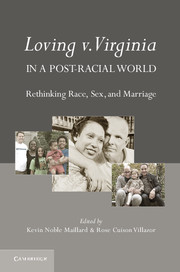Book contents
- Frontmatter
- Contents
- About the Contributors
- Acknowledgments
- Foreword
- Introduction Loving v. Virginia in a Post-Racial World
- Part One Explaining Loving v. Virginia
- Part Two Historical Antecedents to Loving
- Part Three Loving and Interracial Relationships: Contemporary Challenges
- 6 The Multiracial Epiphany, or How to Erase an Interracial Past
- 7 Love at the Margins
- 8 The Crime of Loving
- 9 What’s Loving Got to Do with It?
- 10 Fear of a “Brown” Planet
- Part Four Considering the Limits of Loving
- Part Five Loving Outside the U.S. Borders
- Part Six Loving and Beyond: Marriage, Intimacy, and Diverse Relationships
- Permission Granted
- Index
- References
10 - Fear of a “Brown” Planet
Published online by Cambridge University Press: 05 July 2012
- Frontmatter
- Contents
- About the Contributors
- Acknowledgments
- Foreword
- Introduction Loving v. Virginia in a Post-Racial World
- Part One Explaining Loving v. Virginia
- Part Two Historical Antecedents to Loving
- Part Three Loving and Interracial Relationships: Contemporary Challenges
- 6 The Multiracial Epiphany, or How to Erase an Interracial Past
- 7 Love at the Margins
- 8 The Crime of Loving
- 9 What’s Loving Got to Do with It?
- 10 Fear of a “Brown” Planet
- Part Four Considering the Limits of Loving
- Part Five Loving Outside the U.S. Borders
- Part Six Loving and Beyond: Marriage, Intimacy, and Diverse Relationships
- Permission Granted
- Index
- References
Summary
Although mulattos were living symbols of the violation of the caste system, unions between blacks and whites in Natchez [Mississippi] still existed. [Some talk] about the commonality of common law marriages, or “permanent alliances,” in 1930s Natchez. Charlotte Mackel Harrison’s husband, Robert, grew up knowing a white Jewish grandfather, Charles Moritz. Harrison’s grandmother Dorcas Walker had two daughters[,Julie and Lucille,] with Moritz, who took an active role in raising the girls. … Under Mississippi state law[,] Moritz could not marry Harrison’s grandmother. If the two had chosen to cohabit, which they did not, the social mores of Natchez society would have tolerated such an arrangement, even though many residents – black and white – would have objected. … Walker and Moritz never married anyone else, and fittingly[,] they died in the same year.
I wonder if Dorcas Walker and Charles Moritz ever contemplated, or dreamed, of the world that now exists in the aftermath of Loving. This is a world where their grandson, who was considered black, would be allowed to marry, and would marry, not one, but two white women prior to his death; where three of their six great-grandchildren are currently in interracial marriages, as is one of their four great-great-grandchildren. Would they approve and cheer, be happy that their descendents are now able to marry people of any race? Or would they, despite their own actions, deride and decry the miscegenation that runs rampant in their family? Did they have conversations about how to raise their mixed-race children in the increasingly segregated South? Or was that a non-issue because their children resided with their mother and were considered culturally, socially, and legally to be black and identified as such? As their great-great-granddaughter, who self-identifies – and is phenotypically, culturally, and socially identified – as black, but is in an interracial relationship, raising a multiracial daughter, I wish I could ask them these questions.
- Type
- Chapter
- Information
- Loving v. Virginia in a Post-Racial WorldRethinking Race, Sex, and Marriage, pp. 141 - 152Publisher: Cambridge University PressPrint publication year: 2012

